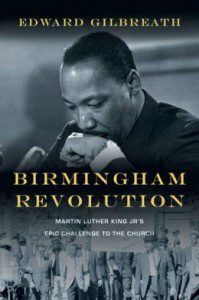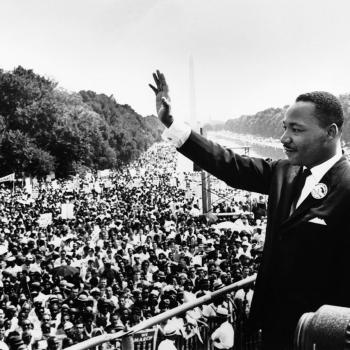 A Conversation with Edward Gilbreath’s Birmingham Revolution: Martin Luther King Jr.’s Epic Challenge to the Church
A Conversation with Edward Gilbreath’s Birmingham Revolution: Martin Luther King Jr.’s Epic Challenge to the Church
The parents of the Protestant Reformation asserted that the reformation is always reforming. Although the children of the Reformation often became mired in issues of biblical inerrancy, the second coming, divine predestination, and the scope of salvation, there is an inherent unrest in Protestantism. We can see the Promised Land in the distance, but we can never claim to fully settle there. God’s horizon beckons us but the horizon in its amazing gracefulness recedes as we move closer to it. God is always near, but God is always more! Accordingly, our quests to describe God, Christ, or the calling of the church are always tentative and always in need of reformation. Moreover, our quests to embody God’s realm “on earth as it is in heaven” are always partial and invite us to an ongoing quest for wholeness and justice among God’s people.
I believe that the same unrest applies to the “Birmingham Revolution,” described by Edward Gilbreath. We have come a long way toward confronting the blatant racism challenged by Martin Luther King, but we have a long way to go to fulfilling God’s – and King’s – dream of Shalom, of wholeness and reconciliation among all God’s children, whether black or white, gay or straight, female or male. God’s horizon of wholeness ever beckons us forward. The beloved community still calls us forward.
One of the most transformative events of our time has been the election and re-election of Barack Obama. For many, this marked the racial healing USA. Whether or not they supported the President in his election bids, they touted this as the end of racism in America. Atlhough Barack Obama’s election reflects a new America, sadly, racism has taken a more subtle and diabolical form, often directed to the democratically-elected President of the United States: the President’s citizenship has been questioned by supposedly rational persons (even though it is metaphysically impossible that such a cover up could have occurred given all the factors needed to keep this secret), the Republican party has treated the President with contempt under the guise of politics (but many of us know that at least some of this is racially motivated), stand your ground laws mostly aimed at persons of color have been passed and justified in the courts, and there has been an attempt to curtail accessibility to polling places and voting rights, all under the guise that we have gone beyond racism.
Sometimes, when persons know their cause this lost, they make one last ditch effort to reverse the process and defeat, if not, humiliate those they perceive to be their opponents. Even African American legislatures of a conservative bent have used lynching language toward our President, something that would never have been done to a white president. Soon a white population majority will be a thing of the past, and many seek to postpone that time for as long as possible.
We still have a long way to go to become the rainbow people God imagines. This week I have been meditating on the prophet Micah, the Hebraic lectionary reading for February 2:
He has told you, O mortal, what is good;
and what does the Lord require of you
but to do justice, and to love kindness,
and to walk humbly with your God?
This was the essence of Martin Luther King’s dream and his “Letter from the Birmingham Jail”: it was spiritual, biblical, and political. King’s letter spoke of justice and shalom, and a nation that embraced the wondrous diversity of humankind as a reflection of divine creativity and not a fall from grace. We are many and our manifoldness is God’s desire. God is the rainbow creator and spins forth more and more diversity in God’s evolving and emerging human and cosmic journeys. In this context, the church is called to be a headlight not a tail light in the quest for God’s Shalom vision.
As a European American Christian, I remain convicted by our country’s waywardness. As a progressive pastor of a moderate congregation, I struggle to walk the talk and talk the pathway of Jesus. While there are many pathways to justice for all God’s children, it is clear that we pastors must always speak words of hospitality, insure that children and families of all kinds are welcome, and constantly lift up in thought, word, and deed the joyful diversity of life and the Christian responsibility to follow always our better angels of affirmation and support, whether or not we agree with another’s viewpoint or have any experience of another’s culture. In the spirit of King’s Why We Can’t Wait, we need to foster a spirit of urgency. Spirits need healing, children need homes, and our brothers and sisters and mothers and fathers need work, housing, and appreciation. Let’s start with that premise and experience a holy discontent as we seek to embody God’s Shalom in daily life and in the life of our nation.
Urgency was at the heart of King’s message and we should embody the urgency of God’s realm. Jesus said the realm of God is at hand, inviting us to repent and believe God’s good news. The good news is that we can be transformed and, dim though it seems, our nation can be transformed. The revolution is always revolving and we need on occasion to be turned upside down so we can see God’s realm as it is intended to be. We need to be partners in Jesus’ vision of God’s good news that calls us to turn around the racism of our time to embrace God’s creation in all its holy diversity.













